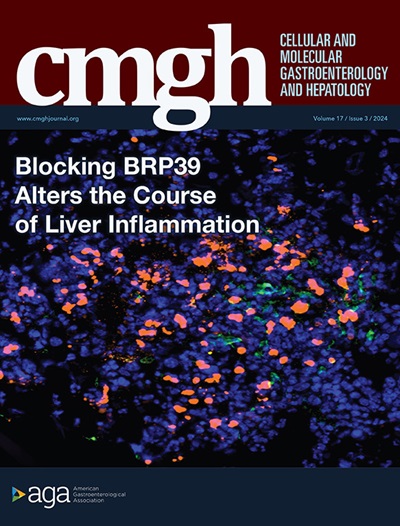Lysophosphatidic Acid Signaling in the Gastrointestinal System
IF 7.1
1区 医学
Q1 GASTROENTEROLOGY & HEPATOLOGY
Cellular and Molecular Gastroenterology and Hepatology
Pub Date : 2024-01-01
DOI:10.1016/j.jcmgh.2024.101398
引用次数: 0
Abstract
The intestinal epithelium undergoes continuous homeostatic renewal to conduct the digestion and absorption of nutrients. At the same time, the intestinal epithelial barrier separates the host from the intestinal lumen, preventing systemic infection from enteric pathogens. To maintain homeostasis and epithelial functionality, stem cells, which reside in the base of intestinal crypts, generate progenitor cells that ultimately differentiate to produce an array of secretory and absorptive cells. Intestinal regeneration is regulated by niche signaling pathways, specifically, Wnt, bone morphogenetic protein, Notch, and epidermal growth factor. In addition, growth factors and other peptides have emerged as potential modulators of intestinal repair and inflammation through their roles in cellular proliferation, differentiation, migration, and survival. Lysophosphatidic acid (LPA) is such a factor that modulates the proliferation, survival, and migration of epithelial cells while also regulating trafficking of immune cells, both of which are important for tissue homeostasis. Perturbation of LPA signaling, however, has been shown to promote cancer and inflammation. This review focuses on the recent advances in LPA-mediated signaling that contribute to physiological and pathophysiological regulation of the gastrointestinal system.
消化系统中的溶血磷脂酸信号传导。
肠道上皮不断进行平衡更新,以进行营养物质的消化和吸收。同时,肠上皮屏障将宿主与肠腔隔开,防止肠道病原体的全身感染。为了维持体内平衡和上皮功能,存在于肠隐窝底部的干细胞产生祖细胞,最终分化产生一系列分泌和吸收细胞。肠道再生受生态位信号通路调控,特别是 Wnt、骨形态发生蛋白、Notch 和表皮生长因子(EGF)。此外,生长因子和其他肽通过在细胞增殖、分化、迁移和存活中发挥作用,已成为肠道修复和炎症的潜在调节剂。溶血磷脂酸(LPA)就是这样一种因子,它能调节上皮细胞的增殖、存活和迁移,同时还能调节免疫细胞的迁移,这两者对组织的稳态都很重要。然而,LPA 信号的干扰已被证明会促进癌症和炎症。本综述将重点介绍 LPA 介导的信号传导的最新进展,这些信号传导有助于消化系统的生理和病理生理调节。
本文章由计算机程序翻译,如有差异,请以英文原文为准。
求助全文
约1分钟内获得全文
求助全文
来源期刊

Cellular and Molecular Gastroenterology and Hepatology
Medicine-Gastroenterology
CiteScore
13.00
自引率
2.80%
发文量
246
审稿时长
42 days
期刊介绍:
"Cell and Molecular Gastroenterology and Hepatology (CMGH)" is a journal dedicated to advancing the understanding of digestive biology through impactful research that spans the spectrum of normal gastrointestinal, hepatic, and pancreatic functions, as well as their pathologies. The journal's mission is to publish high-quality, hypothesis-driven studies that offer mechanistic novelty and are methodologically robust, covering a wide range of themes in gastroenterology, hepatology, and pancreatology.
CMGH reports on the latest scientific advances in cell biology, immunology, physiology, microbiology, genetics, and neurobiology related to gastrointestinal, hepatobiliary, and pancreatic health and disease. The research published in CMGH is designed to address significant questions in the field, utilizing a variety of experimental approaches, including in vitro models, patient-derived tissues or cells, and animal models. This multifaceted approach enables the journal to contribute to both fundamental discoveries and their translation into clinical applications, ultimately aiming to improve patient care and treatment outcomes in digestive health.
 求助内容:
求助内容: 应助结果提醒方式:
应助结果提醒方式:


